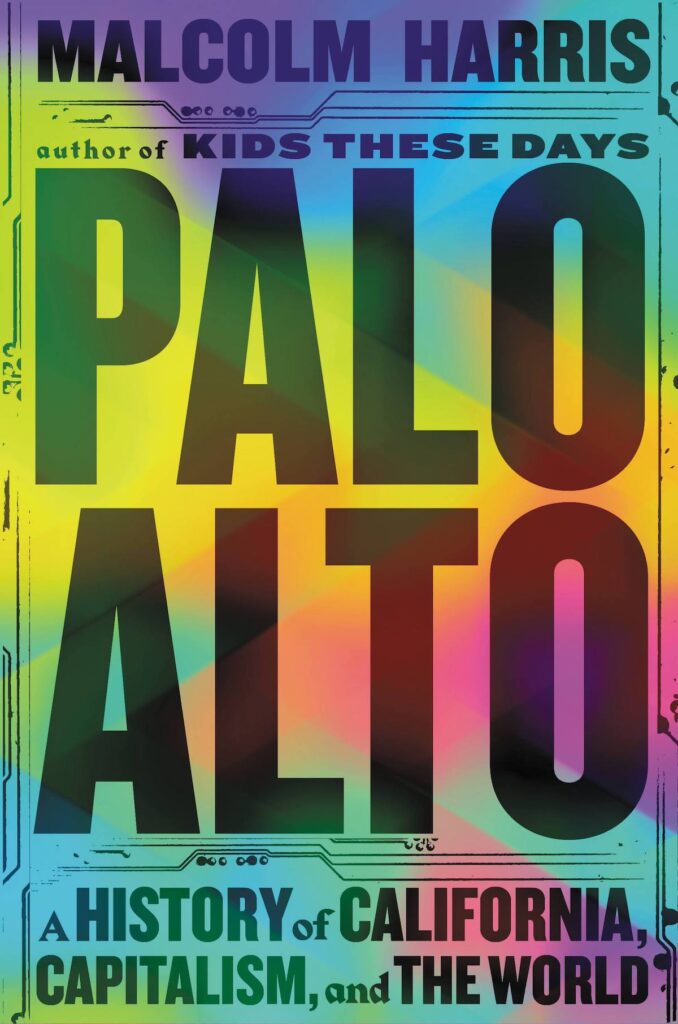I first learned about Malcolm Harris’ new book, Palo Alto, when I read a review by Gary Kamiya in The New York Times. Kamiya trashes the book, deriding it for being what it is: A Marxist interpretation of the birth of Silicon Valley:
“Palo Alto” is nominally a history, but it is really a work of grand theory, in this case a familiar one: Marxism. Karl Marx’s long shadow darkens every page. For Harris, as for Marx, capitalism is the root of all societal evil, an amoral “superintelligence” that relentlessly turns those caught in its thralls into either moneymaking machines or oppressed victims. “Capital by its nature dominates labor,” Harris writes, “and if it fails to accomplish that, it ceases to exist.” It is inherently racist: “The human-capital production system was hostile to everyone except certain white men, as eugenicists designed it.” It is a totalizing system that represses human agency and offers no escape: We are “like butterflies, pinned live and wriggling onto history’s collage.” Harris finds hope in such rare outbursts of wing-flapping as the brief heyday of the Black Panther Party, which he asserts was the most important American political group of its time. If enough butterflies flap their wings, they could shatter “history’s display case.” But what should replace this capitalist horror show once it’s been shattered? Harris never tells us.
Umm … most of what Kamiya complains about strikes as pretty much true. Capitalism—at least the modern, post-Reagan, late-stage capitalism that now dominates the United States—is indeed the source of much of the nation’s problems. Capital does by its nature dominate labor, and the system has always been inherently racist. The Black Panther Party was hugely important.

(Kamiya also dismisses Marx because of the failure of the Soviet Union, which is an old, and odd, approach: It’s entirely possible to study and appreciate Marx’s analysis as brilliantly descriptive of the failures of capitalism without being devoted to his specific proscriptive ideas; we are a long way from 1848. Besides, the Soviet Union under Lenin and especially Stalin bore no resemblance to anything Marx and Engels, who believed in the withering away of the state, could ever have imagined.)
And if Malcolm Harris can answer Kamiya’s question about what precise system replaces late-stage capitalism and how exactly it will work then he’s smarter than me, and smarter than almost anyone I know: Those of us on the economic left have lots of visions and ideas, but nobody has the perfect magic potion, probably because there isn’t one.
So I went and bought the book. I’m very glad I did.
Palo Alto is a big, sweeping epic, 677 pages including footnotes, and it covers a lot of the history of Northern California. There’s more about the details of the interactions and conflicts between difference sectors of the New Left in the 1960s than I needed, but that doesn’t detract from the overall message:
Silicon Valley, and particularly Stanford University, played a key role in the post-War Military Industrial Complex, in creating the massive economic inequality that plagues the nation today, and in promoting the neo-liberal model that ended the New Deal in the 1980s.
I spoke to Harris by Zoom this week. The interview has been edited (a bit) for space and clarity.
Help us save local journalism!
Every tax-deductible donation helps us grow to cover the issues that mean the most to our community. Become a 48 Hills Hero and support the only daily progressive news source in the Bay Area.
48HILLS You early on refer to the post-war Silicon Valley engineers as “shock troops for economic enclosure.” When I think about the word “enclosure” I go back to the early days of mercantile capitalism in Europe, when people were literally enclosing public land with fences so they could graze their sheep and nobody else could use it, and that was one of the building blocks of what we now see as capitalism.
MALCOLM HARRIS Yes, on the technological or intellectual property level that’s totally something you see coming out of Stanford as the archetypical cold war university where you go from the big science era of public research to the privatization and the commercialization of science that happens in the cold war era. Stanford takes a huge role in that with the research park and the whole silicon industry that comes out of that, not to mention the Stanford professors who are working for this nonprofit institution at the same time encouraged to for-profit ventures … taking these publicly researched findings and directly privatize them. When you see that bridge from the Roosevelt era to the Reagan era, Palo Alto played a big role in that.
48HILLS And a lot of that is the political and economic legacy of Herbert Hoover. Hoover wrecked the economy and was replaced by Roosevelt, but then he landed at Stanford and the Hoover Institution became a big part of this.
MALCOLM HARRIS The Hoover Institution goes from being the war library, which it has been previously, to become the citadel of anticommunism, and it really serves as the shady back room for the Republican Party and the conservative movement. One of the main theses of the book is that Hoover outlasts Roosevelt.

48HILLS A lot of the theme from your book is this idea of the privatization of public space, physically and intellectually, but also this idea that the private sector is better than the public sector.
MALCOLM HARRIS Yes, in the globalization of the labor flow and the performance of global labor arbitrage, moving jobs wherever they were cheaper, always.
48HILLS Another theme you talk about is Silicon Valley and colonialism.
MALCOLM HARRIS I try to map out the full narrative. It starts with full military force in south Asia, the flubbing of the situation in China, Mao wins, you fight to a draw in Korea and lose in Vietnam, so clearly a ground war isn’t going to work. So in this era, you see the United States linking up with post-colonial entities who could be swayed to the US economic agenda, and Silicon Valley played key roles in those, whether with the Shah of Iran or Marcos in the Philippines or the royal family of Saudi Arabia, or Idi Amin in Uganda, Silicon Valley has close relations with dictatorships. That continues to the present day; look at Silicon Valley’s relationship with the gulf monarchies. It’s very tight.
48HILLS This happened, you say, because fascism is closer to capitalism than communism.
MALCOLM HARRIS You see tech companies going into Germany and Japan after World War Two and that’s because of the situation created by the Nazis and the imperial Japanese government that had crushed the labor movement. These tech companies say, that’s great for us, we love the crushed labor movement.
48HILLS One of the things I found very interesting is some of the sixties ethos, the Ken Kesey ethos, you say was less than useless to the left. There was a merging between the individualist elements of the sixties and the tech movement.
MALCOLM HARRIS I don’t think that’s nearly as important as it’s made out to be. The Grateful Dead were not the most important thing in the world, the Cold War was the most important thing in the world.
48HILLS There were a lot of people in my generation who thought that taking LSD and going back to the land was more important than organizing labor.
MALCOLM HARRIS The conflation between the counterculture and the new left is erroneous. The left was the left, they were relating to global communism. They were against The Man, but they were also in favor of Ho Chi Mihn. If you say the New Left was feckless and individualist, if that’s how we think, then we can never improve on what they did and what they did was very sophisticated. … a lot of people spent the seventies and eighties and nineties doing minoritarian struggles wherever they were. The idea that we can write people off because Jerry Rubin became a real estate agent is not helpful.
48HILLS Another idea you talk about, which is a very Silicon Valley thing, is shifting compensation from wages to stock options. That undermines the ability to do traditional labor organizing because your pay is linked to management. It also shifts the mindset of a generation that we’re more interested in the stock market and growth than about economic inequality. The old labor movement was, to a certain extent, about redistribution, about taking some of the productivity wealth from the owners and returning it to labor.
MALCOLM HARRIS One thing that’s very interesting is that those were helpful outcomes of the stock option policy, but what it really was for Hewlett Packard when they started it was a free loan where they didn’t have to surrender any control of the company. You got your employees to loan you back their pay, planning to cash out sometimes later. It costs the company nothing to do that, they don’t have to pay interest on this loan. Because these employees aren’t organized, it’s as individuals, as one individual stockholder you have no power. That’s still definitely the case as way to access capital and lower your labor costs. The story we tell is when the stock options succeed, and you make a lot of money, and it turns workers into management, but it’s also a way of cheap labor. If it doesn’t succeed, they don’t have to pay you anything at all.
48HILLS Talk about the role of Stanford and the post-war tech industry and the US military.
MALCOLM HARRIS Stanford really leads that relationship. This is another example of Hoover outlasting Roosevelt, the form of the government research that gets determined is through the military.
48HILLS There are these great tech fortunes made, Bill Gates makes billions off Microsoft, then you think about the Gates Foundation, Bill Gates, philanthropist. But the model also fits into the tech industry model, instead of paying taxes to the government, and letting the elected representatives of the people decide how to spend it Bill Gates gets to decide what public priorities are.
MALCOLM HARRIS Jane Stanford was the one who got the tax exemption for Stanford University. The foundation of Palo Alto and Silicon Valley is a tax dodge, and an act of rich person philanthropy that ends up determining so much of the future of the nation, as opposed to the public interest. That story follows the whole history of the book.
48HILLS: Looking to the future, I see all this talk about decarbonization and electrification as climate solutions, but the “decarbonization bros” as the New York Times calls them, are part of the Silicon Valley culture, and the electric grid is still mostly private.
MALCOLM HARRIS I don’t think capitalism can solve the problems that capitalism has created. Electric SUVs are not going to solve our problems, and neither are metal trees that do decarbonization. I don’t see these as a way out for us now.




